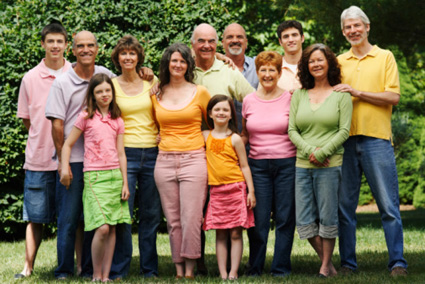Grandchildren Impact Family Dynamics

Last Christmas, as in previous years, I made sure I had the same number of gifts for each of my three grown children and son-in-law. Not only that, I always work out what I’ve spent to make sure it’s equal. The grandchildren, of course are separate, but I make sure they each have the same number of presents too. They do count them but to date, they haven’t figured out if the value of the gifts is the same.
Two of my grown children don’t have children yet, so I don’t have to worry about equalizing gifts and time spent with grandchildren. And they humor me in my enthusiasm (bordering on addiction)for the children of their sister.
However, I am very aware that my childless children want their share of my time and affection too. The role of a parent doesn’t change just because our kids grow up. A grown child still looks suspiciously at any signs of favoritism that isn’t directed specifically at him or her. There are classic examples of family feuds where one grown child is seen to have benefitted with more education, more financial support than another. That kind of resentment can be irreparable.
When a grandchild is born, the dynamics can change for other members of the core family too. If there is already conflict among siblings, the birth of a grandchild can exacerbate the conflict, especially if it appears that the grandparents are showing excessive favoritism to the family with the new baby.
Callum and Heather of Fort McMurray have three grown children, all married. When their oldest son Murray married very young and had two daughters, Calum and Heather helped them out a lot, both with money and babysitting. Now their other two children have married and have children, but according to these two siblings, the continued attention paid to Murray and his daughters is seen as favoritism. Their daughter, Karen says “My mother took a trip to Scotland last summer and invited Murray’s daughters, both in their 20s to go with her. My fifteen-year-old son would have loved to go. I feel there has been enough done for my brother and his girls.”
Kent and Marlene of Sarnia have a son and a daughter. Their son isn’t married but their daughter is married with two toddlers. “Our lives and family gatherings seem to focus around Lucy and her family. Fortunately, our son Jack is really laid back and very flexible, but I know it isn’t fair that all the attention goes to his sister’s family these days,” says Marlene. “I hope Jack knows I love him just as much even though he must see all my time and energy being spent on Lucy and the kids.” Jack weighs in with his opinion too: “I can understand my parents wanting to spend time with their new grandkids and that’s okay with me. But Lucy expects me to be gaga over the baby and offer to babysit too. There’s a limit to my brotherly love,” he says, grinning.
As grandparents, we have to continue with the emotional juggling act we managed with our own children. That means treating every grandchild the same in terms of time, energy and gifts. Faith of Fredericton laughs as she talks about the baby pictures on her piano. “I have to make sure I have an equal number of grandbaby photos to represent the families of my children,” she says. “I watch each of my children eyeing the pictures and doing mental calculations.”
It’s important to make the same fuss over each new grandchild, so that our children feel they’re being fairly treated. That means not comparing grandchildren. Faith explains her strategy: “I almost make a list of what I am going to say at family get-togethers about each grandchild, making sure I dole out equal amounts of praise and anecdotes,” she explains. “I have to be careful too because our daughter and her family live far away, and they can’t always be here to benefit from the attention or defend themselves at family gatherings.”
Part of the same juggling act is to be inclusive, and that means putting sons- and daughters-in-law on equal footing with our children and making sure step-grandchildren know they’re just as important as our biological grandchildren.
Just because we know we love all our children and grandchildren the same, it doesn’t mean they know that. I told one of my grandsons that my password was his second name. He looked at me quizzically and asked, “Does that mean I’m your favorite, grammie?” “No,” I told him, “Your name just has the right number of letters.”